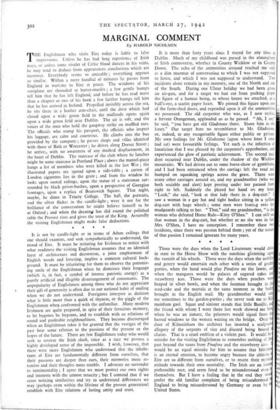MARGINAL COMMENT
By HAROLD NICOLSON
THE Englishman who visits Eire today is liable to false impressions. Unless he has had long experience of Irish ways, or unless some rivulet of Celtic blood dances in his veins, he may tend to deduce from appearances conclusions- which are incorrect. Everybody seems so amicable ; everything appears so similar. Within a mere handful of minutes he passes from England in wartime to Eire at peace. The windows of his aeroplane are shrouded in butter-muslin ; a few gentle bumps tell him that he has left England, and before he has read more than a chapter or two of his book a few further bumps tell him that he has arrived in Ireland. Propelled invisibly across the sea, he sits there in a leather arm-chair, until the door which had closed upon a wide green field in the midlands opens again upon a wide green field near Dublin. The air is soft, and the voices of the men who hold the gangway strike on muffled ears. The officials who stamp his passport, the officials who inspect his luggage, are calm and courteous. He climbs into the bus provided by the company ; he passes shops and villas identical with those of Bath or Worcester ; he drives along Dorset Street ; he arrives, with no awareness of any marked displacement, in the heart of Dublin. The staircase of the club where he lunches might be some staircase in Portland Place ; above the mantel-piece hangs a list of members who were killed in the last War ; the illustrated papers are spread upon a side-table ; a carton of London cigarettes lies in the grate ; and from the window he looks upon sooted railings, upon the statue of a statesman sur-. rounded by black privet-bushes, upon a perspective of Georgian frontages, upon a replica of Brunswick Square. That night, maybe, he dines in Trinity College. The hall, the portraits, and the silver flicker in the candle-light ; were it not for the brilliance of the conversation he might believe himself to be at Oxford ; and when the decantg has slid round the polished table the Provost rises and gives the toast of the King. Assuredly the visiting Englishman might make false deductions.
* * * *


























 Previous page
Previous page